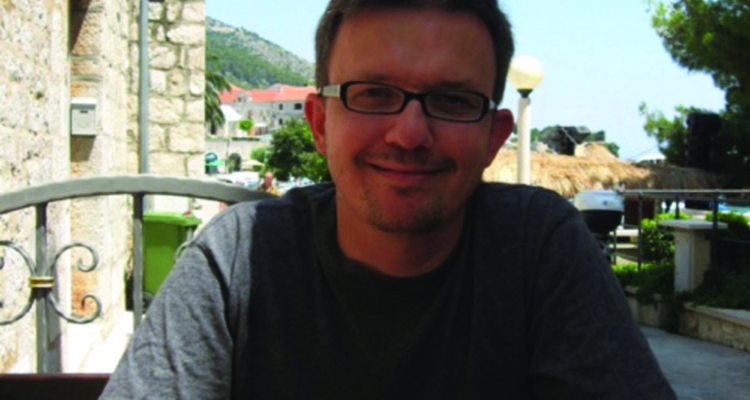BY ELLA KOVACEVIC, STAFF WRITER
“War was always here. Before man was, war waited for him. The ultimate trade awaiting its ultimate practitioner,” American novelist Cormac McCarthy wrote in his epic Western, Blood Meridian.
Thirty-one years later, the statement is accurate. Even in 2016, themes of war are incessantly relevant throughout the world. This includes persistent Syrian civil war reports, an escalation between Turkey and their Kurdistan Worker’s Party and increasing threats of Russian nuclear war. McCarthy’s statement is impossible to refute. For Bellarmine’s own Dr. Fedja Buric, professor of history with a focus on nationalism, identity and the Balkans, such an idea is especially accurate and always has been. He harbors remnants of past wars within his own character.
In 1992, Buric was a mere 13-year-old. While children his age across the world may have been in the middle of frolic, Buric found himself in the middle of a civil war in what was then Yugoslavia, fleeing his hometown of Mostar, located in southern Bosnia, in a helicopter to the temporary safety of a neighboring country, Montenegro.
Upon returning to Mostar once a few months had passed, a war yet again ravaged Yugoslavia. This one was much more pertinent to Buric and his family, a war between Muslims and Croats (Catholics), and Buric was a product of a mixed marriage. With a Muslim father and a Croat mother, Buric was susceptible – even as a faultless teenager – to nationalistic hatred.
In June of 1995, Buric and his family immigrated to the United States after living in two Turkish refugee camps, and in 1998, Buric attended Bellarmine as a history major as a part of the honors program, eventually graduating and studying abroad at Oxford University and Cambridge.
Buric’s personal experiences provoked his focus on nationalism, the modern Balkans and identity. He includes his own experiences in Bosnia as an emphasis in his teachings, which include main objectives such as understanding how influential past events can be in solidifying connections to the present.
“The war very much impacted my career,” Buric said. “It made me curious as to why people chose certain identities, and I wondered how social traumas and social changes like wars impacted the way people live everyday life.”
For Buric, teaching at Bellarmine was a “stroke of luck” as a result of Dr. Margaret Mahoney’s retirement. As a professor at Bellarmine, Buric hopes to guide students through an experience that was as “rich and formative” as it was for him during his undergraduate experience.
For students such as Joseph Coleman and Thomas Herm, both freshmen in Buric’s Western World 116 (1450 – 1870) course, Buric is already succeeding in his goal. Coleman, who previously deemed history classes boring, states that Buric provides interesting information.
“Some of his personality comes out when he teaches. He also likes when we have anything to ask or say,” Coleman said.
Herm added it’s pretty rare for history teachers to hail from a different country, which only adds to his effective teaching.
“His foreign background gives unique perspectives on topics and modern events,” Herm said.
Even for students in his Western World 117 (1870 – present) class, Mitchell Siefker insists that Buric has quickly become a favorite because of his personality.
“He is consistent and friendly, making him a trustworthy person and professor,” Siefker said.
During the miniscule amount of free time Buric chances upon outside of his course load, he spends it by reading, running, or enjoying reruns of his favorite TV shows such as House of Cards and Friends. He keeps himself extra busy by working on a new project, which is a large research project focusing on war criminals during the wars in Yugoslavia. He hopes to collect enough research and conduct interviews with incarcerated prisoners in order to publish a book, which will further the importance of past events and their impact on worldly living today.
“It will depend on the willingness of some of these prisoners to participate, as some of them are serving sentences all over Europe, and it depends on if prison authorities of these specific countries will let me see them,” Buric said.
For now, however, Buric can be found in lecture halls “contributing time and effort in teaching at Bellarmine – an amazing privilege.”

